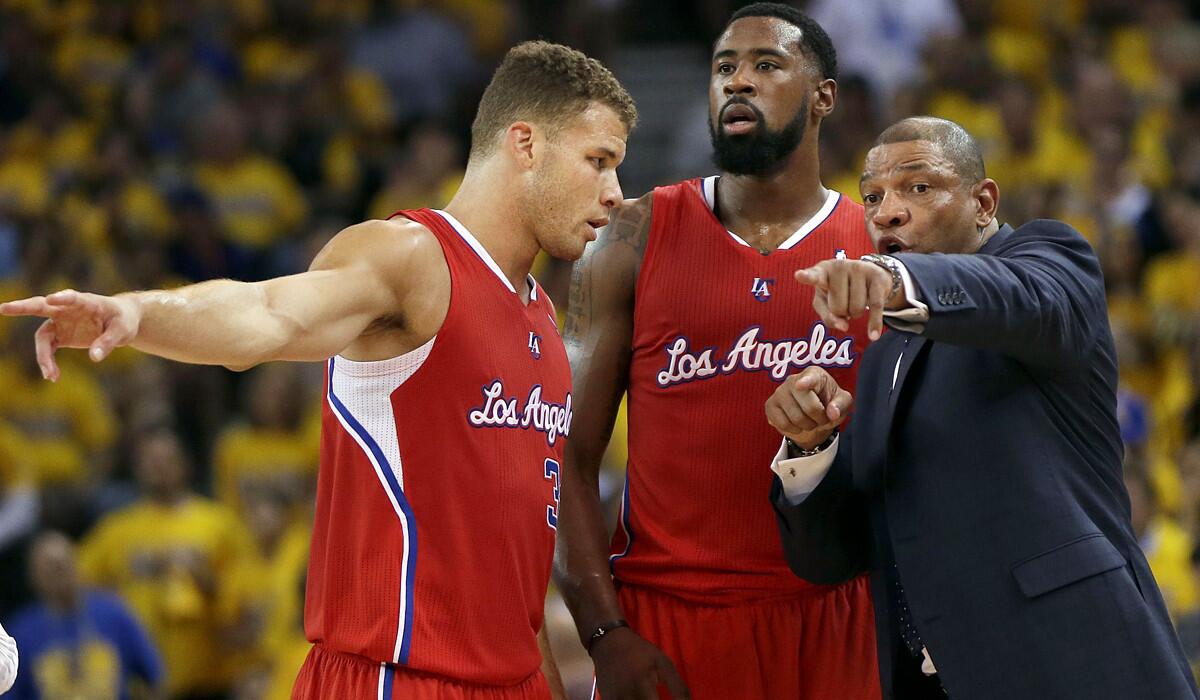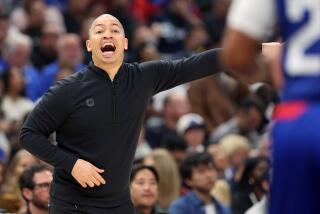Clippers Coach Doc Rivers gives staffers some excellent coaching too

Doc Rivers spent the morning before his first Game 7 with the Clippers meeting with marketing, finance and ticketing instead of guards, forwards and centers.
The coach addressed offensive statements rather than offensive execution.
He spoke in a conference room as opposed to a practice court.
For about an hour Friday, a decisive game in a first-round playoff series against the Golden State Warriors was nudged aside in favor of a more formidable adversary.
Derogatory statements about blacks attributed to team owner Donald Sterling continued to seep into every corner of the franchise, three days after NBA Commissioner Adam Silver had banned Sterling for life and instructed other owners to oust the 80-year-old from the league.
Staffers who worked out of the Clippers’ Staples Center offices had seen Rivers and his players express outrage over their owner’s remarks. But who spoke for them? And did anyone care that they had been the ones primarily handling the public backlash, fielding calls and emails from irate fans who branded them sellouts, racists and Uncle Toms, not to mention a slew of unprintable descriptors?
“Employees felt like they did not have a voice,” said Raymond Ortegaso, the team’s director of human resources, “and were being attached to the comments that were being made by Sterling.”
A statement issued by team President Andy Roeser on Saturday in defense of Sterling only seemed to exacerbate the situation.
“A lot of people in the company did not feel comfortable with that,” said Maurice Baker, a group event specialist. “I wasn’t happy with it.”
Rivers learned of a touchy staff meeting held Thursday, the same day the Clippers lost Game 6 in Oakland. After landing at Los Angeles International Airport about 1:30 a.m. Friday and watching film of the game until around 4, Rivers asked Ortegaso if he could address the employees a few hours later.
And so at 10 a.m., after making the drive from his office in Playa Vista to downtown L.A., Rivers stood before a group of about 70 staffers inside Staples Center and delivered a simple but meaningful message: hang in there.
“Ticket people, marketing people, they’re sitting there crying, and I felt so bad for them,” Rivers said. “I was thinking, my gosh, we’ve been in this thing and as coaches you forget that these are the people that are on the front line and they work for the organization too and you just felt so bad for them.”
Baker said a few community groups had backed out of their relationships with the Clippers as a result of Sterling’s comments, with some remaining estranged even after the owner was removed from day-to-day operations of the franchise.
Staffers also had to contend with the widely held perception that they fully supported the views of their owner.
“It was hard because you read things,” Baker said of Sterling’s remarks, “and people kind of automatically attribute it to you because you work for the Clippers.”
Cippers players weren’t the only team employees who contemplated a boycott. Some staffers considered not coming in to work Monday because they did not know how to respond to the anticipated public outrage.
“That’s hard to deal with,” Baker said, “when you don’t have all the answers or any answers.”
Rivers made them feel like they were starting to figure it out even at a time when he has questioned his own future with the franchise. When the naturally gifted orator had last stood before staffers, in the summer after taking the Clippers job, he told them that winning an NBA title required having a championship organization as well as a championship team.
Now those same employees told Rivers they felt like the organization essentially had to start over.
“I told them, ‘Yeah, you’re right, you do,’” Rivers said. “There’s no quick solution to this. There’s no banner that ‘Everybody will be good.’ So we’ve got to redo it and I told them that. I told them I want to be there for them as much as I can, but it’s hard.”
Rivers helped make it easier by drawing from the playbook of great leaders, showing up and saying he cared. After the last employee question was posed and Rivers answered, the group broke into applause.
“It meant a lot to have Doc come down here and say, ‘I’m sorry you guys are hurting,’” said broadcast manager Jessica Bojorquez.
Said Baker: “It made me feel a lot better knowing someone of his stature cared about us.”
Rivers also cared about beating the Warriors, though film study suddenly didn’t seem as important as a lesson in sociology.
“You’re sitting there and you’re thinking, you know, before Game 7 I should be sitting in the office,” Rivers said. “But what I did [Friday] for me was far more important than this stuff because they need it, they really do. Like, they need it even more than our players right now. They need somebody.”
Thanks to Rivers, they have their man.
Twitter: @latbbolch
More to Read
Go beyond the scoreboard
Get the latest on L.A.'s teams in the daily Sports Report newsletter.
You may occasionally receive promotional content from the Los Angeles Times.











